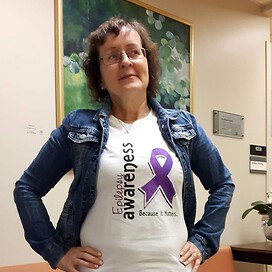Believing My Daughter: A Parent's Perspective
When my daughter was small, she had a seizure that lasted 5 minutes. We rushed her to the ER, and it felt like they didn’t believe me until she had a seizure right there in the emergency room, and they saw it for themselves.
Facial seizures and invisible symptoms
My daughter often experiences facial seizures, with twitching around her eye, on her cheek, and mouth—sometimes accompanied by tingling sensations. These are just some of the side effects she deals with. I don't always see the seizure happen, as sometimes it occurs beneath the skin and is invisible to the eye. She might tell me afterward that she had one, or that she's having one at that moment. When she first started having seizures, she couldn’t speak during one. Afterwards, she described the experience as "having a bandaid ripped off her tongue."
The challenge of epilepsy
Epilepsy is tricky; it likes to catch parents, caregivers, and loved ones off guard. My daughter has no warning before a seizure happens. Anti-seizure monitoring devices or seizure alert pets won’t help her, due to the specific type of seizure she experiences. It’s a constant state of alert.
After speaking with her neurologist to confirm that what she was experiencing was indeed a seizure (since there are over 40 different types), I realized it wasn’t that I didn’t believe her. I just wanted to rule out all other possibilities so my daughter could receive the right care.
Fighting to be believed
Living with an invisible illness, chronic illness, or disability—epilepsy included—is a huge challenge. Questions like “Who do you believe?” or “Are they faking it?” are things that go through your mind. It’s hard for others to understand what you or your loved one is going through when the symptoms aren’t always visible.
Becoming your child’s advocate
As a parent or caregiver, you end up doing your own research. In some cases, you become your child’s voice—not just for them, but for your entire family. You become the quarterback, setting appointments and coordinating care with medical professionals. It’s like playing a parental game of Whack-a-Mole—always trying to stay one step ahead, ready to address the next issue as soon as it arises.
You are not alone
If you are a parent or caregiver to someone with a chronic, invisible illness or disability, including epilepsy, you are definitely not alone. While our journeys may be similar, no two are identical. Find support through agencies and age-appropriate online support groups for all members of your family. Do your research.
Epilepsy Affects the Entire Family
Epilepsy does not just affect the person experiencing the seizures, it affects the entire family. I hope the content I provide can help you and your loved one.
Signed, Lorrie parent/caregiver perspective
Join the conversation